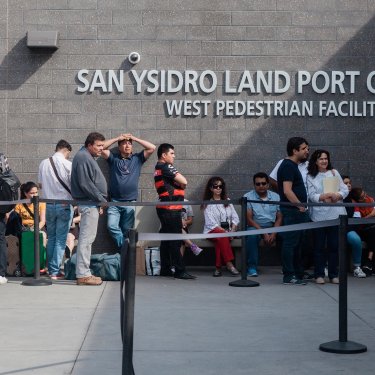US - Leaked database shows US government has been secretly monitoring journalists at US-Mexico border

Reporters Without Borders (RSF) questions the legality of a secret US government database showing journalists investigating the migrant caravan have been tracked and flagged for secondary screening at the US-Mexico border, with some even having alerts placed on their passports. This offense on the First Amendment and journalistic independence must be rectified by Customs and Border Protection (CBP) immediately.
The United States government created a secret database on journalists, activists and others that they believe should be stopped for questioning when crossing border checkpoints in the San Diego area, according to leaked documents news channel NBC 7 in San Diego published on March 6. They list the names of nearly 60 people, including 10 mostly American journalists, that had been investigating or providing aid to the migrant caravan that arrived at the border from Honduras. Agents have questioned or arrested at least 21 of those individuals, according to interviews with those individuals and documents obtained by NBC News station KNSD-TV. Some had alerts placed on their passports, and at least three photojournalists were denied entry to Mexico.
The documents, which are dated to early January, have been used by agents from CBP, Immigration and Customs Enforcement (ICE), US Border Patrol, Homeland Security Investigations and agents from the Federal Bureau of Investigation’s (FBI) sector in San Diego. Several people told NBC News that agents who stopped them for secondary screening said they were being questioned as part of a “national security investigation,” mirroring CBP’s claims that the people on this list were to be questioned in an effort to learn more about violence that broke out on the border in November, for which the journalists, as well as activists, lawyers and others. were allegedly present.
Included in the documents are photos of each individual taken from their passport or social media account, personal information including their date of birth, “country of commencement” and alleged role in relation to the caravan, and whether officials placed an alert on their passport. Some individuals had an “X” over their photograph, signifying they had been arrested, interviewed, or had their visa revoked by an official. In addition, agents also created dossiers on each individual. Two of the dossiers shared with the news channel were labeled with the names of journalists who were also listed as targets of secondary screenings, though no additional details were provided. A different dossier, of an attorney for a migrant and refugee law center, included specific details such as the car she drives, her mother’s name, and her work and travel history.
“The surveillance of journalists on this level is likely illegal and is an absolute abuse of power from CBP, one that proves the suspicions an increasing number of journalists have shared anecdotally: that the US government is monitoring their activities as a consequence of their work,” said Daphne Pellegrino, Advocacy Officer for RSF’s North America bureau. “Journalists cannot be stopped for questioning for simply doing their jobs, nor can they be used as an arm of federal law enforcement investigations. We are meeting with CBP alongside other journalistic organizations and will ask them to ensure this targeted surveillance of journalists at the border does not continue.”
A report the Committee to Protect Journalists (CPJ) published in October detailed the cases of 37 journalists were stopped collectively for secondary screenings more than 110 times. Since then, RSF, CPJ, the Reporters Committee for Freedom of the Press and other journalistic organizations have been engaging with CBP to discuss our shared concerns regarding border stops.
The United States ranks 45th out of 180 countries in RSF's 2018 World Press Freedom Index.



